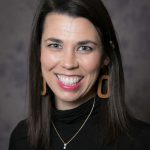While faculty and students were adjusting to digital classrooms, The University of Alabama’s staff was working to keep their offices productive from their homes.
From advising students on their courses, to informing potential new students of what UA has to offer and building strong relationships with alumni, the staff in the UA College of Engineering set up shop in their homes and made themselves available digitally.

Liz Moore, assistant director for alumni engagement, had more than a few challenges early in the quarantine, but she made the most of her predicament.
“For the first three weeks of remote work, I was actually stuck in Peru due to border closures,” Moore said. “That was certainly challenging. I was not prepared to be working while away. So, I only had my cell phone. I quickly learned how to adapt and was able to keep things moving.”
Working on spreadsheets, video conferencing and emailing from her phone was difficult, and once she returned home, the situation didn’t get much better.
“Not so conveniently, my 10-plus year old laptop finally died on week five of shelter in place,” Moore said.
Fortunately, she was able to bounce back quickly, and got a routine under her belt working on a desktop computer at her dining room table. She connects to colleagues through video teleconferencing and office chat rooms.
“That’s been helpful. We’re all in this together. There have certainly been some missteps, but I think that’s all part of it. We’re learning. This is an adjustment for everyone,” Moore said.
One positive to come from this challenging time has been her ability to connect with alumni. Typically, it can take weeks to set up a phone call between busy schedules, but as the world slowed down, she has found it easier to catch people for a quick conversation.“
I’ve really enjoyed having more candid, casual conversations with a lot of folks during this time,” Moore said. “I feel like I’ve learned a lot about our alumni, and their deep care for our students and the college as a whole during this time.”
She’s kept herself busy by participating in multiple webinars and online professional development courses. Plus, she organized three lunch and learn sessions for students and alumni to connect virtually.
“I’ve seen our Capstone Engineering Society community show up for one another. Words of encouragement, willingness to help in recruiting, and being willing to talk and think through things strategically has been really good,” Moore said. “It seems that everyone is stretching themselves in new ways to adapt and make the most out of a difficult situation.”
She hates that the May class of 2020 missed out on spending their final months as a student on campus and a regular graduation, but she is also encouraged by their strength.
“As we welcome this class as alumni, I have been impressed with their resiliency and determination. I am confident they will go on and do impressive things in their career, and I look forward to continuing to walk with them in this process,” Moore said.
For returning students, mid-way through the spring semester is a time they usually start preparing their fall class schedules and registering. With the University closed, students were unable to meet with their advisers on campus, and they had to find new ways to connect with each other.

“I think we’ve learned to be adaptable and that there are a lot of ways to connect with students and get the job done,” said Tyler Roberts, assistant director of engineering student services.
His office has worked to meet with students through video chats, and they have also converted many of their printed documents, forms and flowcharts to digital versions. However, he said the interactions he has with students haven’t really changed all that much.
“It’s still about making the student feel comfortable, engaging them in conversation, and finding out what their needs are to help them be as successful as possible,” Roberts said.
For the most part, he says working from a distance has gone better than expected with only minor complications. The real difficulties for him come from being a working parent, which has been a bit of a juggling act.
“For me the biggest challenge has been balancing work with parenting responsibilities while the kids are at home,” Roberts said. “Trying to keep some semblance of a schedule with a 4-year-old and 7-year-old has been tough, but we’ve gotten into a good routine and made it work.”
Advising students is only one facet of Roberts’ job. His office also contributes to UA’s orientation, Bama Bound. To facilitate the completely online orientation sessions, his team made 12 two to three minute videos to introduce the foundational information all new engineering students need to know.
“We developed and implemented an entirely online orientation experience for incoming students and have been meeting with students [virtually] throughout the summer to get them prepared for the fall,” Roberts said.

Switching to online recruitment of engineering students has been a very collaborative endeavor for Samantha Proctor, coordinator of engineering student recruitment.
“Although there are no in-person visits on campus, I am still connecting prospective students to UA’s College of Engineering on a daily basis,” Proctor said. “I have worked closely with [UA’s] admissions [office] and my fellow campus partners on developing the best ways to engage prospective students with UA virtually.”
In addition to phone calls and emails, Proctor has hosted virtual faculty chats, Q&A panels and information sessions to connect potential new students with each engineering department, the student Ambassadors of the College of Engineering and scholarship specialist Mary Kathryn Poe. She also worked with the manager of web communications to create a new Virtual Visits page on the UA engineering website featuring videos and 360-degree facility photos taken by Cris Porter, director of technology services.
Even with all the virtual teamwork and connection, Proctor said she misses seeing her colleagues and meeting potential students and their families every day. She has discovered just how important interacting with others is to her.
“My role revolves around interacting with people,” Proctor said. “I greatly miss in-person meetings, but have felt I still have been able to connect the prospective students to UA virtually through our offerings with admissions.”
Roberts is proud of the hard work his colleagues have put in to making this experience the best it can be for engineering students, and he thinks it will strengthen the College in the future.
“They say necessity breeds innovation, and our team stepped up to the challenge under difficult circumstances to serve our students. I think carrying that creative outlook over when we are able to return to campus is going to be vital to us being as efficient and effective as possible moving forward,” Roberts said.